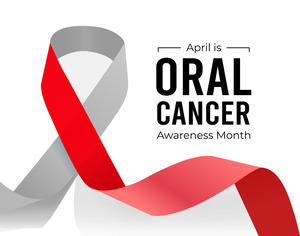
For each hour of the day, there is someone who dies of oral cancer. Over 54,000 people are expected to be diagnosed with the disease in 2023, and only 57% of them are expected to survive longer than five years. The more you know about oral cancer, the better position you’ll be in to have it dealt with properly. In the spirit of Oral Cancer Awareness Month, here is important information regarding risk factors and symptoms of oral cancer and the importance of regular screenings during dental visits.
Risk Factors for Oral Cancer
You may already know that oral cancer tends to be particularly prevalent in people over the age of 45. It’s also strongly associated with people who smoke or drink a lot of alcohol. More recently, research has found a connection between oral cancer and HPV. Finally, if you spend a lot of time outside without protection from the sun, cancer might develop on your lip.
Bear in mind that nearly a tenth of oral cancer cases occur in people who don’t have any known risk factors. So even if nothing in the previous paragraph applies to you, it’s still important to keep an eye out for signs of oral cancer.
Symptoms of Oral Cancer
Oral cancer doesn’t manifest in the exact same way in every mouth. You should familiarize yourself with a wide range of possible warning signs. Some of the most common symptoms that you need to watch out for include sores that don’t heal, discolored spots on your soft tissues, odd lumps or growths, denture sores that don’t go away even after your denture has been refitted, or any areas that tend to bleed easily.
Some of these symptoms can point to other conditions as well. A trained professional will need to examine your mouth and perform the necessary tests to confirm the presence of oral cancer.
The Importance of Oral Cancer Screenings from Your Dentist
Did you know that all dentists are trained to perform oral cancer screenings? This gives them an opportunity to look for warning signs that you may not have even realized were there. If you’re screened regularly by your dentist, you’ll be more likely to know when a biopsy is necessary, which means you can have your oral cancer treated sooner, giving you a better chance of survival over the next five years.
If you have concerns about oral cancer, consult your doctor or a dental professional as soon as you can to see what steps they recommend.
About the Author
Dr. Sajini Shetty has been in the dental field for more than 20 years and sees every day as a new opportunity to improve the lives of her wonderful patients. She completed her Advanced Education in General Dentistry (AEGD) at New Jersey Dental School. During each checkup, she keeps an eye out for signs of oral cancer and other issues so that her patients can get the care they need quickly. To set up a consultation with Dr. Shetty at Dental Designs of New England in Merrimack, visit her website or call (603) 429-2199.









